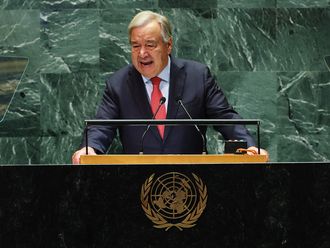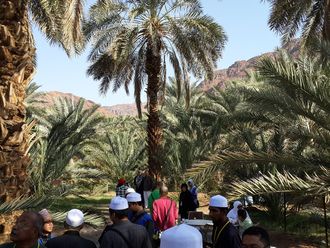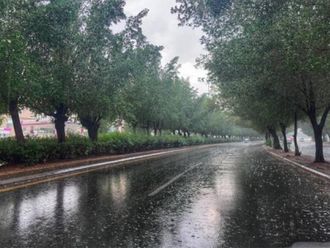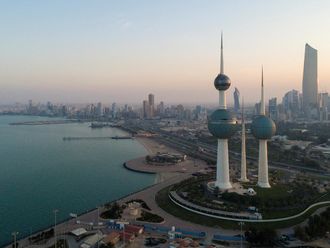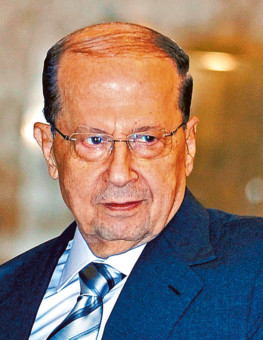
Beirut: The seventh session of the Lebanese Parliament failed to assemble a quorum last Wednesday when only 63 of 128 lawmakers (22 short of the 85 required) gathered that, true to past performances, ensured yet another postponement in the constitutional duty to elect a president for the republic. Speaker Nabih Berri promptly fixed the next convocation for July 2, although General Michel Aoun, the Free Patriotic Movement leader and March 8 stealthy candidate, chimed in a day later with what amounted to an ultimatum: me or chaos.
In his interview on the FPM-owned OTV television station, Aoun suggested he was the natural choice because he enjoined a numerical majority among Christian representatives in parliament, although he could only boast preponderance among Maronites, not all Christians. Among the 64 Christian parliamentarians, 34 seats were allocated to the Maronite community, of which 15 were FPM members. Aoun added the 3 Maronite votes of the Marada Movement to this list that gave him a slight majority. Of course, this meant that a nearly equal number were on the opposite side though such details failed to register in what promised to remain a highly polarised society.
Aoun sought the support of the Future Movement, whose backing promised to make of him a unifying candidate, and called on former Prime Minister Saad Hariri to change course and settle on the strongest Christian leader. Such a step, he believed, would not only help him reach the country’s top post but, in a moment of sheer hubris, so that he, Aoun, could guarantee Hariri’s security.
Viewers were shocked to hear Aoun’s vow that he — and he alone — could protect Hariri from political assassination were he to return home. “I told him [Hariri] that I can guarantee his political security if he returns to Lebanon but noted that I cannot guarantee it if I’m not in power,” Aoun declared, which directly implicated his March 8 allies in past and current security breaches.
It took several FPM minions the better part of Thursday, Friday and Saturday to explain and clarify what the 80-years-old General meant to say, although the damage was done.
Equally controversial was the epochal statement made by Sulaiman Franjieh, the head of the pro-Syria Marada Movement, when he affirmed that no one could be elected president in Lebanon within the approval and blessings of the Syrian head-of-state Bashar Al Assad. A week earlier, President Al Assad voiced his approval of Michel Aoun, though March 8 tenors, led by Hezbollah officials, kept silent on the matter. Only the Progressive Socialist Party leader, Walid Jumblatt, opined that such backing did not add value.
Jumblatt met Hariri in Paris on Friday although little leaked — so far — of this meeting amid the latest bombing that rocked the country. For now, the PSP candidate, Aley deputy Henri Helou was still an official candidate, though it was difficult to see how March 14 deputies could vote for him.
Observers concluded that Aoun and Helou, or for that matter, Samir Geagea — the leader of the Lebanese Forces and official March 14 candidate — could not gather the 65 magical votes required to win and that an alternative personality, individuals like Ziyad Baround (a former Minister of the Interior), Riad Salame (the Governor of the Central bank), or Jean Qahwaji (the Commander of the Lebanese Armed Forces), may have to fill the void.
It was interesting to note that Qahwaji appealed to the Lebanese to stay calm after the latest bombing and rejected the fear mongering that he determined was largely exaggerated.
To its credit, the Government of Prime Minister Tammam Salam handled the latest security challenge with aplomb, though it still faced an existential dilemma as no agreement was reached over the cabinet’s internal mechanism to rule and, with a little luck, prepare for the next parliamentary elections in November 2014.
For now, it was amply clear that Lebanese politicians lacked the courage to address the presidential void, as well as the upcoming parliamentary abyss that was programmed to occur on 17 November. In fact, the most likely scenario was another postponement of parliament’s term, as few took note that the Ministry of Interior required six months to prepare for elections under existing laws, assuming that candidates who declared their intentions and who filed the necessary paperwork would have their applications revalidated.
Gripped by football fever, Lebanese citizens concluded that their politicians were working hard to transform the country into a full-fledged failed state, with the latest joke in Beirut insisting that “Lebanon was Somalia on Liposuction and Lipstick.” This was not very pretty though few looked forward to July 2, when parliament was rescheduled to choose a new leader for the country. Speaker Nabih Berri’s latest 2-week-long postponement was probably a rehearsal for a longer stay, which may well have to come after ‘Eid Al Fitr, unless a behind-the-scenes agreement was reached to appoint General Aoun.




